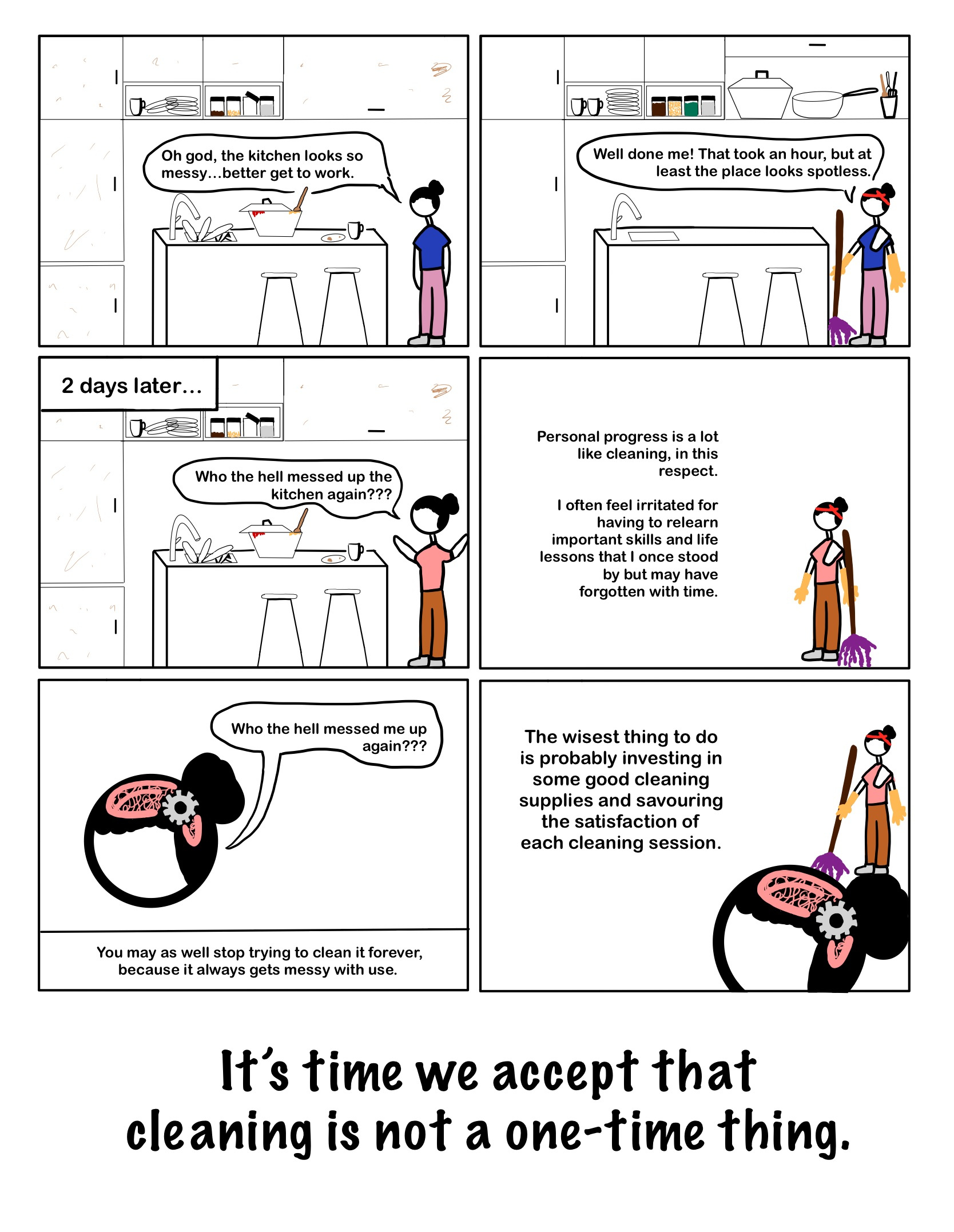Week 3 of Leadership in Action: A Comic for Thought

A comic felt like a fitting medium for my third reflection, because at this point in my LIA, I am experiencing an outpour of insights. Since a picture is heralded for being worth a thousand words (frankly, the idiom should consider being more ambitious with that number), six comic panels felt like an efficient way to pack my thoughts into my reflection. Comics have also proved to be incredibly useful in generating discussions within my meditation course. Participants constantly surprise me by generating new interpretations of the stick-figured content that I’ve included in my teaching material. I’ve similarly created this comic as a conversation starter that can accommodate a wide variety of connections, while maintaining the spirit of playfulness and humble exchange.
Below, I explain how the comic captures some of my key takeaways from the third week of my LIA. The comic features a character who is disappointed to find her meticulously cleaned kitchen returned to its formerly messy state. Like Sisyphus, the charachter's finds herself again at the bottom of a mountain of dirty plates. Yet, after her initial sense of defeat gives way, she may recognize that the fact of her return is trivially true. Of course, she has to clean up again. Cleaning is not the kind of task that can be completed in one burst of activity, as much as college students might protest. No matter how deep you clean your space, if you plan on using it, you will have to go back to cleaning closet at some point. So, it is irrational to lose sleep over your inevitable return to the beginnings.
From my time at Mind-BWW, I’m witnessing how the same is true of therapeutic journeys. Progress is not something that is achieved but upheld, from both the care-receiver and caregiver points of view. On the program participants’ side, the fight for better mental health is continuous. Just because participants are doing better on one day does not guarantee that this trend will continue to the next week. Three weeks has been sufficient time to witness ebbs and flows in participants’ involvement during the community programs. Between the program sessions, several unforeseen events and idiosyncratic factors may have aggravated their mental health condition. Hence, participants are challenged to closely monitor their present state and find ways to endure interruptions in their progress. Much like cleaning, the participants must deal with each day as if anew, while continuing to collect and leverage the therapeutic tools at their disposal.
Meanwhile, the charity staff and community program leaders also need to be committed to the relentlessly iterative process of promoting well-being. If these helpers have their hearts set on curing participants, they are doomed to fail. With so many uncontrolled factors shaping participants’ lives and recovery, the staff and leaders must be willing to reteach and re-engage participants when mental health progress may recede.
In addition to modeling therapeutic journeys, the comic applies to the staff’s persistence in organizing the community programs. The staff cannot evade having to secure funding, coordinate logistics, contact participants, set up, and tidy up after all events. These are undying tasks that cannot be completed, because they constitute the definition of running a community program. As with cleaning a kitchen, running a program can only be sustainable when the staff find ways to enjoy the ritual acts involved in execution. It is an especially modern affliction to get bored of repetition. However, as has become evident through Mind-BWW’s admirable work, so many things of value only emerge through repetition.
For my part, when delivering my meditation course, I feel a sense of relief after completing each Wednesday session. When next week rolls around, I vaguely feel like I’m transported back to a messy kitchen in need of my efforts. Luckily, the insights underpinning this comic have been powerful in helping me relish my work cycle. Granted, at the end of my six weeks, my time in this kitchen will come to a close. Although I am not remotely made to feel that way, I recognize my status as a guest at Mind-BWW.
Part of being a good guest is acknowledging the privileges that I may experience compared to the permanent workers and volunteers. While the adrenaline rush of being in a new place may help sweeten up my experience, the charity staff and leaders are here for the long run. If there are confronted with boring or discomforting parts of the job, they do not get to abandon them in six weeks time. I take the time to applaud their commitment and vitality in delivering their programs. In the best of all possible ironies, by sticking to the old hard ways of conscientious management (the organizational equivalent of cleaning), they keep their kitchen looking completely new.
In essence, cleaning can refer to maintaining a home or symbolically be extended to several other iterative processes like pursuing better mental health or running community initiatives. It’s time we accept that cleaning—in all these forms—is not a one-time thing.




Please sign in
If you are a registered user on Laidlaw Scholars Network, please sign in